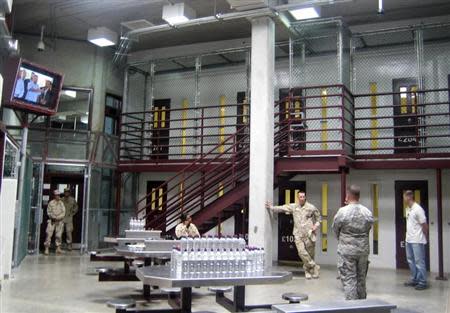Guantanamo judge urged to lift ban on claims of abuse

By Tom Ramstack FORT MEADE, Maryland (Reuters) - Defense attorneys for five detainees in the September 11 conspiracy case asked the Guantanamo war crimes tribunal on Tuesday to lift restrictions on their clients from publicly discussing maltreatment by their American captors at the upcoming trial. A "gag order" from the tribunal's judge violates the United Nations Convention Against Torture, the attorneys say. "Everywhere I turn in investigating this issue, we hit a brick wall," said Cheryl Bormann, who represents Walid bin Attash, a Yemeni accused of training some of the September 11 hijackers at an al Qaeda camp in Afghanistan. Bormann spoke at a pre-trial hearing at Guantanamo Bay U.S. Naval Base in Cuba, during a closed-circuit broadcast monitored by Reuters at the Fort Meade, Maryland, army base. Her complaint was one of several accusations leveled by defense attorneys alleging U.S. government abuse of authority. Bormann said the protective order Army Colonel Judge James Pohl issued in January, along with classified information guidelines, impaired her ability to properly represent her client. The five suspected al Qaeda conspirators claim the maltreatment consisted of beatings, sleep deprivation, being subjected to temperature extremes, stress positions and waterboarding, a technique that simulates drowning. During the administration of George W. Bush, the CIA was authorized to use what were called "enhanced interrogation techniques." When President Barack Obama took office, he forbade use of the techniques, referring to them as torture. "If you really want to have a fair trial, you have to ungag them," Bormann said. Pohl said his protective order was designed to prevent the release of information that might endanger national security. The military sometimes categorizes statements from "high-value" prisoners as classified. Bormann said the restrictions are inappropriate in cases like those of the Guantanamo detainees because they could be executed if they are convicted of terrorism, hijacking and nearly 3,000 counts of murder stemming from the September 11, 2001, attacks. "If the United States government wants to prevent these men from talking about the horrific things that happened to them, you can't have it both ways," Bormann said. "You can't gag somebody and then kill them." Last February, the judge asked the attorneys to sign a memorandum of understanding agreeing to limit public statements about the case that he said involved classified information. Four of the five attorneys refused to sign. The judge questioned whether the attorneys could prove that lifting the restrictions in his protective order would pose no threat to national security. The issue is relevant for the accused conspirators because in death penalty cases maltreatment of prisoners is considered "mitigating evidence" that may reduce their chances of being executed. The defendants and their attorneys want to present evidence during their trial that would include testimony from the United Nations' former special rapporteur on torture. In addition, the 1984 Convention Against Torture signed by the United States not only prohibits torture, it requires nations to give maltreatment victims options for complaining publicly and seeking reparations. Justice Department attorney Clay Trivett argued that detainees can file lawsuits and seek redress through U.S. federal courts if they have a complaint. He described the information the military forbids from being released as "properly classified" and said lifting the protective order could threaten U.S. national security. The detainees' right to redress through the courts satisfies U.S. government obligations under the Convention Against Torture, Trivett said. Earlier in the day, defense attorneys claimed U.S. military guards at the Guantanamo Bay detention facility had improperly seized private legal documents from the accused conspirators. The attorneys accused Guantanamo guards of taking legal papers stamped "privileged" from the detainees' cells despite a court order forbidding the seizure of confidential attorney-client documents. "From time to time at least, it's just been ignored," said attorney David Nevin, who represents Khalid Sheikh Mohammed, the confessed mastermind of the hijacked plane attacks in 2001. During the hearing, the men, dressed in white traditional tunics and headdress, sat at courtroom tables, speaking occasionally with interpreters and their attorneys. Nevin and other defense attorneys said improper seizure of the defendants' legal documents could interfere with their rights to a fair trial. Judge Pohl set limits on what guards could seize at an earlier hearing. "I am concerned that if I issued an order and it is not being followed," additional measures might be needed to get guards to comply, said Pohl. "I want to get this resolved." The chief prosecutor, Brigadier General Mark Martins, suggested some of the guards might be confused about the restrictions as they regularly search for contraband. The judge did not rule on the defense attorneys' requests Tuesday. No date for the trial has been set. (Editing by Tom Brown and Gunna Dickson)
